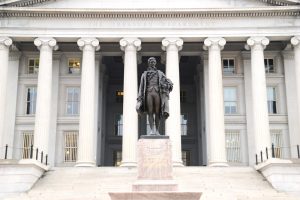Leading Western democracies have imposed a new round of sanctions on Myanmar’s military government, including the United States’ imposition of limited sanctions on the state-owned Myanmar Oil and Gas Enterprise (MOGE), the military’s single largest source of foreign revenue.
In a statement yesterday, the U.S. Treasury Department said that it was imposing a financial blocking action against MOGE, in order “to degrade the regime’s ability to purchase weapons to carry out atrocities against the people of Burma.”
The designation “prohibits certain financial services by U.S. persons,” beginning on December 15, Treasury said. These services include loans, accounts, insurance, and investments.
“Today’s designations close avenues for sanctions evasion and strengthen our efforts to impose costs and promote accountability for the regime’s atrocities,” U.S. Secretary of State Antony Blinken said in a separate statement. “We continue to encourage all countries to take tangible measures to halt the flow of arms, aviation fuel, and revenue to the military regime.”
While Treasury did not add MOGE to its Specially Designated Nationals (SDN) list, which would lock it out of the U.S. banking system and bring the threat of secondary sanctions into play for any other foreign entity dealing with it, it is the first time that Washington has directly targeted MOGE – a long-standing demand of human rights activists both within and outside Myanmar. About 50 percent of the country’s foreign currency comes from natural gas revenues, and MOGE was expected to earn around $1.5 billion from oil and gas projects in 2021-2022, according to a Myanmar government forecast.
The U.S. government has previously imposed sanctions on the managing director and deputy managing director of MOGE, but has balked at adding it to the SDN list, likely out of fear that it would create sanctions liabilities for companies that deal with MOGE in neighboring Thailand, a U.S. security ally. The European Union has also sanctioned the enterprise.
The blocking action against MOGE was also accompanied by an announcement that the U.S. was aligning its sanctions regime with Canada and the United Kingdom, in order to maintain “our collective pressure on Burma’s military and denies the regime access to arms and supplies necessary to commit its violent acts,” Under Secretary of the Treasury for Terrorism and Financial Intelligence Brian E. Nelson said in the Treasury statement.
As such, Treasury said that it was designating three entities and five individuals that it said were closely connected to the military regime.
As part of this alignment effort, the U.K. and Canada governments announced separate tranches of sanctions on individuals and entities in Myanmar. Stating that it “unequivocally condemns the regime’s brutal campaign against the Myanmar people,” the U.K. said that it was adding five individuals and one entity involved either in providing financial services to the regime or the supply of restricted goods including aircraft parts.
Canadian Foreign Minister Mélanie Joly also announced the imposition of sanctions against 39 individuals and 22 entities for supporting Myanmar’s military regime, saying that it was aimed at building “on previous sanctions and diplomatic efforts to end the sale and transfer of arms to the military regime.” As Reuters observed, neither country mentioned MOGE in its announcement, and it is unclear if this was included in the harmonization efforts.
The announcement was welcomed by Myanmar’s opposition National Unity Government, which is spearheading the resistance to military rule. In a post on X (formerly Twitter), the NUG’s Human Rights Minister Zin Mar Aung said that her government “welcome[d] this important step,” but said that there was “much more” that the world could do to combat the junta.
Tom Andrews, the United Nations Special Rapporteur on the situation of human rights in Myanmar, said in an emailed statement that the coordinated announcements were “an important signal that governments that support human rights and the people of Myanmar are prepared to link their actions into a coherent and powerful whole.” He then called on U.N. member states “to take stronger, coordinated action to support the heroic efforts of the people of Myanmar to defend their nation and save their children’s future.”
The new round of sanctions come at a decidedly unwelcome time for the military administration in Naypyidaw. An alliance of ethnic rebel groups this week launched a coordinated offensive against Myanmar’s military administration and its allies in the northern part of Shan State.
The attack is being carried out by the Three Brotherhood Alliance, which includes the Arakan Army, the Myanmar National Democratic Alliance Army, and the Ta’ang National Liberation Army, and has been accompanied by attacks on junta positions by other resistance groups. The Alliance has since overrun military outposts and seized key population centers across northern Shan, including the town of Chinshwehaw on the Chinese border, and has cut the main highway connecting Myanmar to major border crossings with China. The ultimate success of the offensives remains unclear, but if the Alliance can hold onto its gains, Operation 1027 (as it is known) has the potential to become a turning point in the country’s civil war.
As the security analyst Anthony Davis wrote for Asia Times on October 29, the current trajectory of the war in Myanmar, far from being a stalemate, has inexorably become one “that favors forces opposed to the Naypyidaw regime.” While the outcome of the current campaign remains unclear, Davis wrote, “Myanmar’s neighbors and the international community more generally would be well-advised to prepare diplomatic, humanitarian, and judicial responses for a morning-after in which a smooth transition to a new federal-democratic order would hardly be guaranteed.”

































